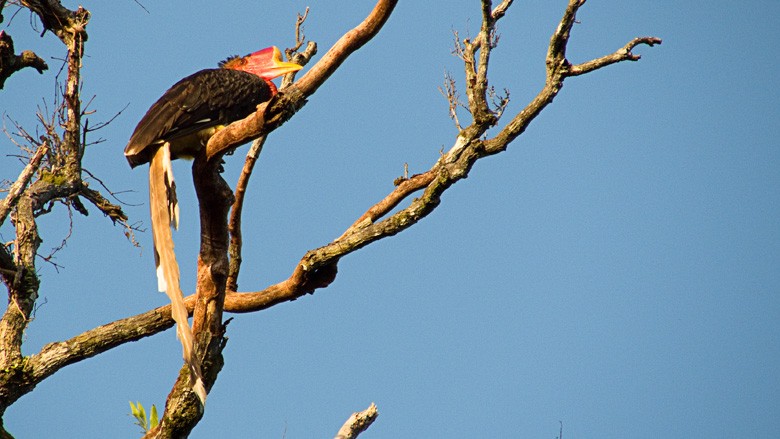Helmeted hornbill critically endangered due to over hunting
The helmeted hornbill, known locally as rangkong gading, is on the brink of extinction due to excessive hunting, a conservationist has said.
Change Size
 The wealth of nature – A helmeted hornbill, known locally as rangkong gading, is perched on a naked tree branch. Rangkong Indonesia director Yokyok “Yoki” Hadiprakarsa said on Monday that the helmeted hornbill was on the brink of extinction due to excessive poaching.
(Rangkong Indonesia/Yokyok Hadiprakarsa)
The wealth of nature – A helmeted hornbill, known locally as rangkong gading, is perched on a naked tree branch. Rangkong Indonesia director Yokyok “Yoki” Hadiprakarsa said on Monday that the helmeted hornbill was on the brink of extinction due to excessive poaching.
(Rangkong Indonesia/Yokyok Hadiprakarsa)
The helmeted hornbill, known locally as rangkong gading, is on the brink of extinction due to excessive hunting, a conservationist has said.
Rangkong Indonesia director Yokyok “Yoki” Hadiprakarsa said that hunters continue to hunt the endangered species, targeting its casque, the large decorative growth of solid keratin on the upper mandible of the bird's bill which sells at a higher price than elephant ivory on the international market.
“Up till now, we have been unable to stop people hunting hornbill for its casque. It is an increasingly organized business, making it difficult for law enforcers to catch the perpetrators. The hunting of the bird continues in forest areas in Central, East and North Kalimantan, which are difficult to reach and close to the Malaysian border,” Yokyok told thejakartapost.com on Monday.
The helmeted hornbill is one of 13 hornbill species in the country. The bird, found in low-land forests in Sumatra and Kalimantan, is 1.7 meters in length with a 90-centimeter wing span. According to Birdlife International data, the helmeted hornbill also lives in Brunei, Malaysia, Myanmar, Singapore and Thailand.
During the 2nd Indonesia Bird Researchers and Observers Conference in Yogyakarta at the beginning of February, the helmeted hornbill was a popular topic.
Yokyok said that the hunting of helmeted hornbill had sharply increased since 2012 and added that Rangkong Indonesia had recorded at least 6,000 helmeted hornbills killed in West Kalimantan due to poaching. Hornbill casques are primarily smuggled via land and sea routes as authorities often foiled attempts to smuggle casques abroad by air. “The smuggling attempts are conducted using hidden routes that are also used to smuggle drugs,” said Yokyok.
The activist said that most hornbill casques confiscated by security authorities in China and the US were from Indonesia, reasoning that this may be because, in addition to weak law enforcement, the world’s helmeted hornbill population was predominantly based in Indonesia.
“Of the total 2,343 hornbill casques confiscated, around 1,200, or 80 percent, were from West Kalimantan. It’s really ironic because the bird is the symbol of the province,” he said.
In 2015, Switzerland-based environmental organization International Union for Conservation Nature (IUCN) Red List listed the helmeted hornbill as critically endangered due to the sharp decline in its populations over recent years. In 2012, IUCN dad listed the species under near-threatened status.
Natural Resources Conservation Agency (BKSDA) West Kalimantan chapter conservation and natural resources data analysis staff member, Subyantoro Tri Pradopo, said that the agency had conducted several operations to stop hornbill poaching. During its last operation in 2015, BKSDA arrested two suspects. Both were sentenced to serve one-year in jail.
Indonesia Ornitology Association chairman Ign.Pramana Yudha said that Indonesia had been blessed to have had such a variety of birds, emphasizing, however, that many were now on the verge of extinction. Around 17 percent of the 2,000 bird species found in Indonesia will soon be extinct.
“It seems that our society is not really aware of the impact of excessive bird hunting and poaching,” he said. (ebf)









